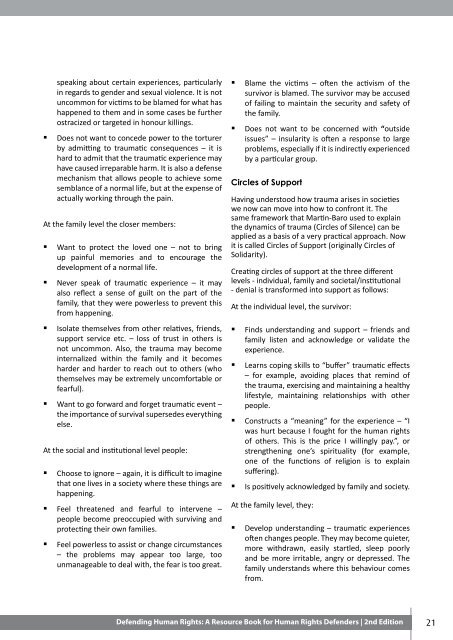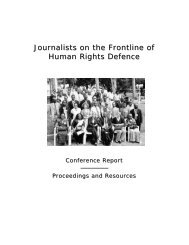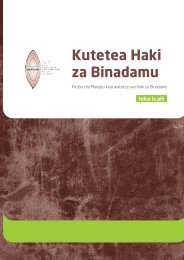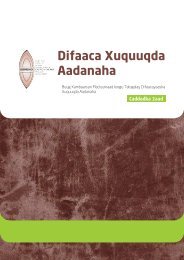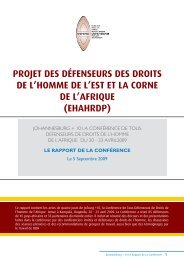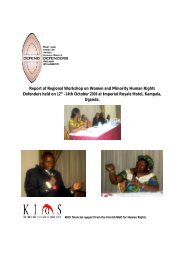Defending Human Rights: A Resource Book for Human
Defending Human Rights: A Resource Book for Human
Defending Human Rights: A Resource Book for Human
You also want an ePaper? Increase the reach of your titles
YUMPU automatically turns print PDFs into web optimized ePapers that Google loves.
speaking about certain experiences, particularly<br />
in regards to gender and sexual violence. It is not<br />
uncommon <strong>for</strong> victims to be blamed <strong>for</strong> what has<br />
happened to them and in some cases be further<br />
ostracized or targeted in honour killings.<br />
• Does not want to concede power to the torturer<br />
by admitting to traumatic consequences – it is<br />
hard to admit that the traumatic experience may<br />
have caused irreparable harm. It is also a defense<br />
mechanism that allows people to achieve some<br />
semblance of a normal life, but at the expense of<br />
actually working through the pain.<br />
At the family level the closer members:<br />
• Want to protect the loved one – not to bring<br />
up painful memories and to encourage the<br />
development of a normal life.<br />
• Never speak of traumatic experience – it may<br />
also reflect a sense of guilt on the part of the<br />
family, that they were powerless to prevent this<br />
from happening.<br />
• Isolate themselves from other relatives, friends,<br />
support service etc. – loss of trust in others is<br />
not uncommon. Also, the trauma may become<br />
internalized within the family and it becomes<br />
harder and harder to reach out to others (who<br />
themselves may be extremely uncom<strong>for</strong>table or<br />
fearful).<br />
• Want to go <strong>for</strong>ward and <strong>for</strong>get traumatic event –<br />
the importance of survival supersedes everything<br />
else.<br />
At the social and institutional level people:<br />
• Choose to ignore – again, it is difficult to imagine<br />
that one lives in a society where these things are<br />
happening.<br />
• Feel threatened and fearful to intervene –<br />
people become preoccupied with surviving and<br />
protecting their own families.<br />
• Feel powerless to assist or change circumstances<br />
– the problems may appear too large, too<br />
unmanageable to deal with, the fear is too great.<br />
• Blame the victims – often the activism of the<br />
survivor is blamed. The survivor may be accused<br />
of failing to maintain the security and safety of<br />
the family.<br />
• Does not want to be concerned with “outside<br />
issues” – insularity is often a response to large<br />
problems, especially if it is indirectly experienced<br />
by a particular group.<br />
Circles of Support<br />
Having understood how trauma arises in societies<br />
we now can move into how to confront it. The<br />
same framework that Martin-Baro used to explain<br />
the dynamics of trauma (Circles of Silence) can be<br />
applied as a basis of a very practical approach. Now<br />
it is called Circles of Support (originally Circles of<br />
Solidarity).<br />
Creating circles of support at the three different<br />
levels - individual, family and societal/institutional<br />
- denial is trans<strong>for</strong>med into support as follows:<br />
At the individual level, the survivor:<br />
• Finds understanding and support – friends and<br />
family listen and acknowledge or validate the<br />
experience.<br />
• Learns coping skills to “buffer” traumatic effects<br />
– <strong>for</strong> example, avoiding places that remind of<br />
the trauma, exercising and maintaining a healthy<br />
lifestyle, maintaining relationships with other<br />
people.<br />
• Constructs a “meaning” <strong>for</strong> the experience – “I<br />
was hurt because I fought <strong>for</strong> the human rights<br />
of others. This is the price I willingly pay.”, or<br />
strengthening one’s spirituality (<strong>for</strong> example,<br />
one of the functions of religion is to explain<br />
suffering).<br />
• Is positively acknowledged by family and society.<br />
At the family level, they:<br />
• Develop understanding – traumatic experiences<br />
often changes people. They may become quieter,<br />
more withdrawn, easily startled, sleep poorly<br />
and be more irritable, angry or depressed. The<br />
family understands where this behaviour comes<br />
from.<br />
<strong>Defending</strong> <strong>Human</strong> <strong>Rights</strong>: A <strong>Resource</strong> <strong>Book</strong> <strong>for</strong> <strong>Human</strong> <strong>Rights</strong> Defenders | 2nd Edition 21


